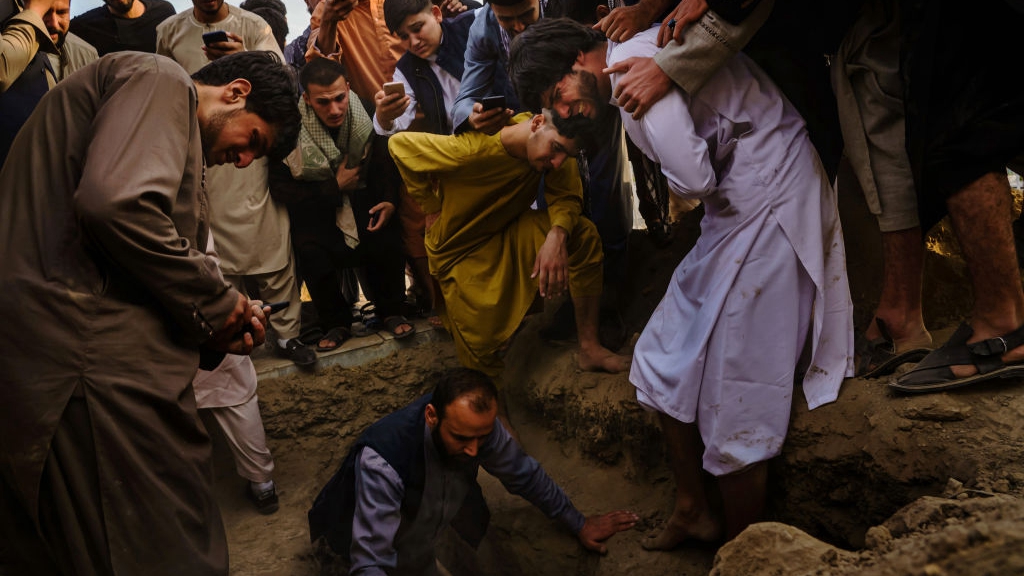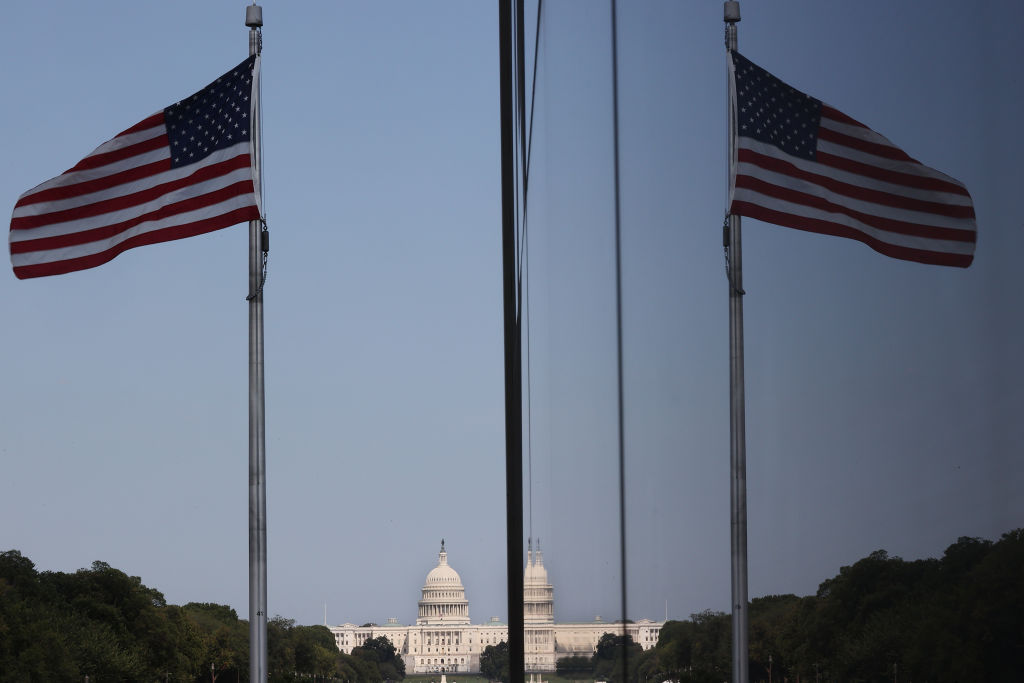
Relatives weep as they bury Nasser Ahmadi, 25, who family said was killed by U.S. drone airstrikes, in Kabul, Afghanistan, August 30, 2021. /Getty
Relatives weep as they bury Nasser Ahmadi, 25, who family said was killed by U.S. drone airstrikes, in Kabul, Afghanistan, August 30, 2021. /Getty
Editor's note: Keith Lamb is a University of Oxford graduate with an MSc degree in Contemporary Chinese Studies. His primary research interests are China's international relations and "socialism with Chinese characteristics." The article reflects the author's opinions and not necessarily the views of CGTN.
It takes a lot of nerve for the U.S. to construct a false narrative of human rights atrocities such as concentration camps, slavery, and genocide in Xinjiang Uygur Autonomous Region, especially, when bordering Xinjiang is, Afghanistan, representative of the worst human rights violations of the 21st century.
If this wasn't irony enough, then one should consider that the measures taken in Xinjiang, such as providing education and reintegrating extremists into society, were in response to devastating terrorist attacks supported by groups funded by Washington through the National Endowment for Democracy (NED).
Certainly, the U.S. would never accept this, nor would they take such soft measures to combat terrorism. Indeed, the U.S.' response to the 9/11 terrorist event led to the invasion of Afghanistan. Considering, according to a conservative estimate by Brown University, 800,000 were killed in the U.S. "War on Terror," the invasion of Afghanistan was surely a "sledgehammer to crack a nut."
If the aforementioned information doesn't provide enough cognitive dissonance, then one should consider that the U.S. has openly admitted, in 2018, that it carried out a series of "punishing bombings" against foreign Uygur separatist terrorists based in Afghanistan. It has been documented that Uygurs fighting in Syria take their families with them, and this is probably the case in Afghanistan too. As such, the U.S. airstrike probably led to significant innocent casualties.
The irony of Afghanistan, the greatest human rights tragedy of the 21th century, is not lost on the Uygurs themselves who will not buy into American propaganda and suffer the same fate. For Afghans, they still live in abject poverty marred by the threat of violence. Their state was turned into the world's opium "farm" producing over two-thirds of the world's opium, and drug addiction runs rife amongst the populace.
The human rights atrocity of the Afghan occupation has been more than just economic stagnation and an outflow of refugees, there have also been human rights violations by the U.S. army. A recent seminar themed "Human Rights Violations Caused by U.S. Military Intervention of Afghanistan", which was a sideline event for the 48th session of the United Nations Human Rights Council, detailed U.S. war crimes such as torture and the wanton killing of civilians in the name of counter-terrorism.

The U.S. Capitol is reflected in the glass of the Washington Monument visitors center entrance on the National Mall in Washington, D.C., August 12, 2021. /Getty
The U.S. Capitol is reflected in the glass of the Washington Monument visitors center entrance on the National Mall in Washington, D.C., August 12, 2021. /Getty
With the aforementioned contradictions, the U.S. cannot stand with a clean conscience on the side of human rights. When taking a deep examination into China's so-called human rights atrocities, the evidence is found to be either faked, exaggerated or distorted, relying largely on witness testimonies that inflate with each performance.
When reality does not conform with propaganda, language is redefined to suit. Genocide becomes "cultural genocide" where a legitimate drive for bilingualism, where eradicating extremist ideology and even economic development is lambasted as cultural destruction.
In contrast, in Afghanistan, the underdevelopment, the destitution and the refugee crisis, which drains Afghanistan of its best people, represent a real cultural genocide for culture can never thrive amongst the suffering of war and poverty.
When it comes to the potential meeting between U.S. President Joe Biden and Chinese President Xi Jinping, for progress to be made, Biden must be cognizant of these U.S. contradictions. For if Biden and the U.S. is to face up to China's peaceful rise then it cannot be done based on a foundation of lies.
Firstly, no one, including China, can trust an actor who has traditionally used lies as the harbinger of war. Secondly, should the U.S. continue to remain in a state of hypocritical delusion, the U.S. will not only continue to disrespect China, but will also continue to make poor self-harming decisions. As such, the U.S. needs to reevaluate its schizophrenic stance regarding human rights as only the sane can be respected and worked with.
Of course, the fact that the U.S. both bombs and funds Uygur separatists points to a bipolar U.S. that does not act in concert. Thus, perhaps Biden may actually believe U.S. atrocity propaganda simply because he dogmatically presupposes liberal democratic systems produce truth.
Nevertheless, even if Biden has been indoctrinated by far-flung tales of genocidal repression in Xinjiang, he would, at any rate, do well to juxtapose what is in fact a thriving Xinjiang next to the neighboring Afghanistan hellscape left by the U.S.
At the end of the day, a sane actor must choose peace and cooperation for belligerence between China and the U.S. risks global war and environmental catastrophe leading to the destruction of civilization which negates any notion of human rights. In contrast, if the U.S. and China work together then we can overcome the shared challenges that our species faces and build a world fit for human rights.
(If you want to contribute and have specific expertise, please contact us at opinions@cgtn.com.)

